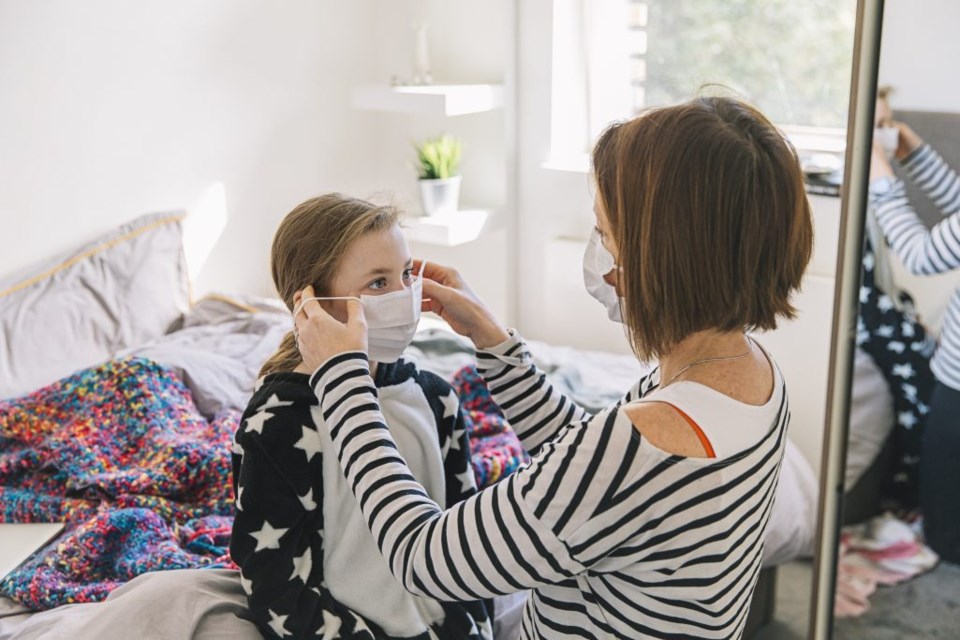Masks have quickly become a staple in the Canadian wardrobe, thanks to the novel coronavirus.
On May 20, chief medical officer Dr. Theresa Tam officially recommended the use of masks — both medical and non-medical — as a measure to avoid spreading respiratory droplets to others, in addition to physical distancing and handwashing.
Now, parents are wondering: does my child need to wear a face mask in public, too?
Children older than two years old should wear a face mask in public spaces where physical distancing is difficult.
Children under two years of age and anyone who has trouble breathing or is unable to remove a mask without assistance should not wear a mask, according to the Centre for Disease Control and Prevention (CDC).
This is mainly to prevent suffocation, said pediatrician Dr. Dina Kulik, but she also thinks it would be difficult to keep a mask on a child younger than two without them touching it and moving it around.
“I don’t know how anyone would keep a mask on their one-year-old,” Kulik said.
She has similar concerns about children older than two wearing a mask, given how uncomfortable masks can be.
“Some kids can be really disciplined and keep their hands away from their face and not touch them,” Kulik said. “Other kids, not so much.”
“It’s not really age dependent; it’s more about your child.”
This is problematic because doctors know that touching your face — especially mucous membranes like your eyes, nose and mouth — is one of the main ways COVID-19 enters the body.
For kids who are particularly squirmy or don’t like things on their face, said Kulik, it might be safer to forgo the mask altogether and instead ensure they don’t come close to other people or touch high contact surfaces.
This advice changes for older children, because you can explain to them “the safety reasons for wearing a mask,” Kulik said.
In any case, all children — whether they’re wearing a mask or not — need to maintain a distance of two metres (or six feet) and washing their hands with soap and water for at least 20 seconds, multiple times per day.
“If you have to take (your kid) somewhere like the doctor’s office … make sure they’re not touching surfaces (or) their face, and that you’re washing their hands really well (afterwards),” Kulik said.
If your child is particularly active, consider keeping them in the stroller for the duration of the trip.
Proper mask use
A number of major retailers, from Starbucks to Whole Foods, are “requesting” that in-store shoppers use face coverings.
You’ll also need a mask if you’re planning to board a plane anytime soon. Having a non-medical mask or face covering has been a requirement for air travellers in Canada since April 20.
You should wash your cloth masks and do so frequently, according to health experts. Mask wearers should take their face coverings for a spin in the washing machine “routinely depending on frequency of use,” according to the CDC.
Cloth masks for COVID-19 should be made of at least two layers of tightly-woven fabric such as cotton or linen, according to Canadian government guidelines. They should also fit snugly on your face covering both mouth and nose.
Questions about COVID-19? Here are some things you need to know:
Symptoms can include fever, cough and difficulty breathing — very similar to a cold or flu. Some people can develop a more severe illness. People most at risk of this include older adults and people with severe chronic medical conditions like heart, lung or kidney disease. If you develop symptoms, contact public health authorities.
To prevent the virus from spreading, experts recommend frequent handwashing and coughing into your sleeve. They also recommend minimizing contact with others, staying home as much as possible and maintaining a distance of two metres from other people if you go out.
In situations where you can’t keep a safe distance from others, public health officials recommend the use of a non-medical face mask or covering to prevent spreading the respiratory droplets that can carry the virus.
For full COVID-19 coverage from Global News, click here.
— With files from Global News’ Erica Alini
Follow @meghancollieMeghan.Collie@globalnews.ca
- Global News
